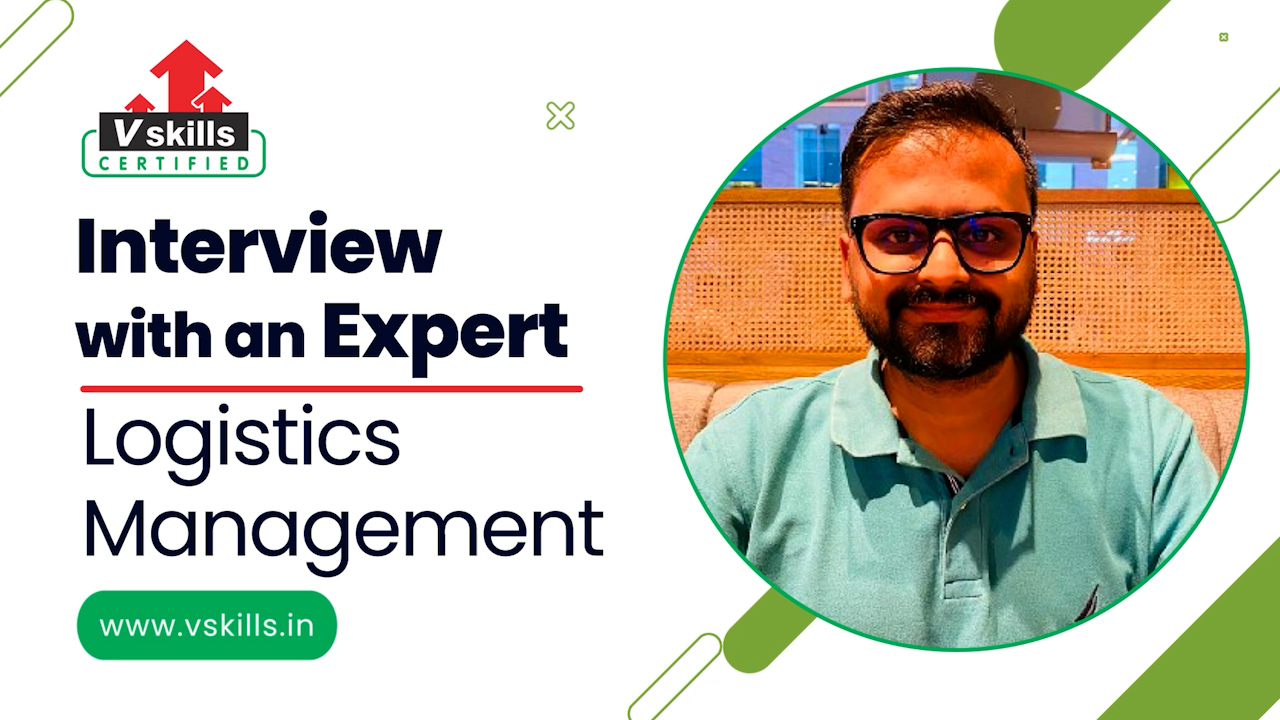Logistics and SCM (Supply Chain Management) relates to managing the supply chain related activities in an organization such as transportation, warehousing and delivering products to the right door. However, strategic management of supply chain and logistics is crucial for organizations, to drive higher efficiencies and reduce costs.
Important Concepts
The basic concepts involved while learning the logistics and SCM are-
- Logistics and SCM Strategy
- Supply Chain Strategic Management
- Strategic Decision Making
- Supply Chain Design
- Logistics Network Planning
- Logistics and SCM Costing
- Logistics and SCM Optimization
- Safety and Security
- Sustainability and Environment
- Risk Management
- Monitoring and Performance Measurement
- Future Developments
Let’s now listen to the leading industry expert Mr. Utkarsh Pathak has 11+ years of experience in logistics and SCM, including planning and engineering, transportation execution, imports and e-commerce. He had worked in senior capacities in Accenture, Delhivery, and johnson methic. And currently working as a senior manager of product strategy at TataNG. We seek his guidance to learn more about logistics management both as a subject and a profession and will know about his career trajectoryin logistics management.
Q1. Why did you choose this field and what are the opportunities available in logistics management?
Answer: To answer the first part of why did I choose to be a part of the logistics and supply chain world. It all goes before my school day. I had a clear-cut guts and instinct liking towards railways, especially the goods train. How do they operate, and that drives me towards what kind of world it is, how it goes around logistics. In graduation as well I got little chance to study about logistics and decided to pursue my MBA in the supply chain. So, that is how it all started. There was always a curiosity that how exactly how something is made available to the customers at the right time & place. That all drive me towards an entire ecosystem of the supply chain and henceforth I am here now.
In terms of opportunities in supply chain and logistics, I think there is enormous seek, and demand for people to get into this ecosystem of the supply chain. Not just in India but overall globally as well. The thing is that every passing day we are trying to solve something or the other for the customers. To fulfil that bridge lot of supply chain innovation is required. Be it logistics, warehousing, transportation or anything else IT setup financially. We all see people who can drive some part and have synergy in collaborations in a way that we can give good customer satisfaction. This is the utmost requirement of each and every firm be it a service industry or manufacturing one. I see a lot of potentials.
What I saw 10 years back and today I see myself and my fellow mates, colleagues, and professionals I see a lot of potential. The potential is going to increase with every passing day.
Q2. What are the skills required for a logistics professional to be successful and make a good career?
Answer: Purely from a skillset point of view, very practically speaking to excel well in the logistic and supply chain industry, you need only 2 things. One of them is a good command of proficiency in terms of excel operations i.e. MS excel, because we have to look into a lot of number data consultancy. There are other tools also, but a student who is entering this field should be a lit but familiar with MS Excel, MS word, and MS PowerPoint. The second scale which is very important and vital is the communication and information part of it. So you need to be more aware of what is going on around the world, the basic sense and the knowledge.
That is the skillset that your awareness will help you excel very deeply and very easily when you have both these skills combined together. So analytical skills and numerical ability is the number one. Other than that being aware of logistics terms and strong communication skills.
Q3. Various logistics and SCM companies are coming up to remove inconsistencies and achieve a higher level of efficiency, what is your opinion about it?
Answer: Horizontal collaboration has become the need of an hour for various organizations. Over a period of time initially, it was more of a VMI-driven approach. Now it has become more of a reality for even a startup. This is because collaboration is done only to increase efficiency. Though it might bring some inefficiencies to the network but then it becomes the collaborative agenda to solve the inefficiencies in the system. The reason, why we are collaborating with someone, is to remove the overall inefficiency and to provide a good customer experience. So, that’s the approach, more and more organizations are trying to collaborate. It’s just that you need to know with whom and at what level you need to integrate with your partner. To gain proficiency in the services which you wish to offer to your customers.
Q4. In the logistics segment, first, come the retail market and the industrial customer are not expecting faster shipments and more transparencies in a competitive market. So how do you handle such requirements?
Answer: For anybody in the supply chain domain, a customer is a customer. We do not differentiate between B2B and B2C. We Understand the business and requirements of customers completely and we have to be 100% transparent to whether a B2B or B2C customer. The idea is that we try to build in some technological tools, so that the visibility, tracking opportunity, and regular MISs are being shared with them. Where is the shipment, why is the delay, what is causing the delay, and how can we control it going further. For a service provider or an industry that is providing solutions to B2B, B2C it does not discriminate.
Q5. A new symbol is being noticed in logistics for retail customers i.e. 10 min delivery that a lot of e-commerce providers are providing, what are your opinions about it?
Answer: 10 min delivery in India is currently at its boom. Everybody is trying to achieve it, it is now coming to a threshold which everybody wants to offer. It is indeed a good service for customers because that is actually transforming the supply chain completely. For the customers, it is a very good thing to have but for the organization, it is the art of burning a lot of costs. To measure the inventory standards to be kept at a dark store, how much to open, how many to be opened, and what will be the manpower. All these questions are currently being answered by the cost and it burns a lot of money for the organizations.
From a customer point of view, it is a very good thing but I think the industry still has to work on a module that we all can offer via a single platform. If that happens, probably everybody could end up having some monetary relief and a good profit margin.
Q6. How do you see an international shipment in domestic logistics, what are the major differences that you follow during international shipments?
For international shipments, the approach slightly differs from the Indian market. In a sense that we need to understand a lot of laws, rules & regulations of the country, either in exporting or importing. The trade balance between these 2 countries as a supply chain or managing import operations needs to be aware of the rules & regulations part it. Also, INCO terms have to be looked into, what is applicable, what is not, and why is applicable. The only difference could be shipping on a higher side of air, more cost probably. The rules of other countries also need to be kept in mind. An African country will not entertain certain types of things, the US will not allow a certain set of things, all these need to be kept in mind while dealing in international shipments.
Q7. A lot of technologies are coming into the logistics domain, what do you think about this digital technology, is it prerequisite for success in logistics?
Answer: Had it been the 1990-2002s era, I would have said that probably an IT setup will not be a prerequisite for success. But from 2010, when the boom in India, I think every sector in India is trying to improve its IT aspect. For example, for transportation, you have to use a TMS(transport management system). It will tell you optimally which vehicle to be used, at what cost, and who does the best work. We also see a lot of predictive analysis going on in terms of data science operations, while we cater for the requirements of customers.
So IT is something which is the essence going for what. The better the IT sector of your organization is, the stronger you will be in the upcoming years. Any organization that wish to explore reaching a good customer base and satisfaction, good numbers and revenues have to invest in IT support. Because even in the supply chain, a lot of problems could be solved using good IT setups. We are dealing with lot of information sharing from customers.
Q8. How do you keep yourself updated on the logistics trends and practices?
Answer: For any professional or student or someone who is trying to enter this ecosystem, there are a few things which people must continue to do. One is to continue learning i.e. what Vskills provide, a lot of certifications could be granted. You can definitely learn a lot of contexts, as a certified logistics professional and try to gain a particular knowledge. So Vskills could be one part of it. Another could be being aware of the local market, what is going on in the market, which policy is coming from, listening to debates, refer to magazines. logistics inside is a magazine that provides you insides, also you can do more certification courses. There is a CII supply chain-driven course as well. All this helps in keeping interacting with industry individuals. LinkedIn is a very important tool to operate, it is not just a job portal anymore.
For someone who is trying to gain some skills and knowledge, these are the key points, to begin with.
Q9. What do you think the logistics market will look like in the next 5 years?
Answer: A lot of manufacturing moving toward the e-commerce domain. E-commerce is getting stronger, government laws will be in place so that they can control the entire dynamic which was not there in the previous segment. There will be more strong laws to drive it, also manufacturing is moving towards it. E-commerce seems to contribute a lot to the GDP growth of the country. From the logistics perspective, there is a balance of trade between roadways and railways. Currently, we are dominating with roadways. A lot of infrastructures are going to be developed in coming years, although I see an inclination towards railways due to fuel factors. We are trying to move into the better segment of it still railways are in a bigger part.
So logistics is being seen to grow and give more opportunities to the individuals and become a good revenue generator for the country. We can solve a lot of problems in the country by having a good logistics system. A lot of development is happening and more control mechanism is driven by the government.
Q10. What is your advice to the students who are looking to build careers in Logistics and SCM fields?
Answer: For somebody who is trying to get into supply chain logistics in India, you will have to be the patient. If any young student reads this if you expect your CTC on day one to be x-number or have exponential growth. Probably that is not going to happen, this particular domain requires a lot of experience before you get into a decision-making role. You need to understand that in the supply chain, you have to be more experienced, you have to see and broaden your entire mind in such a way that you take up the right decision, as it affects a customer directly. You need to change your thinking process.
The only advice is to be patient in your initial years and learn as, much as possible. Even after completion of your degree, try to attain knowledge for a few years. Only then you can see exponential growth inters of CTC, profile and everything else.




